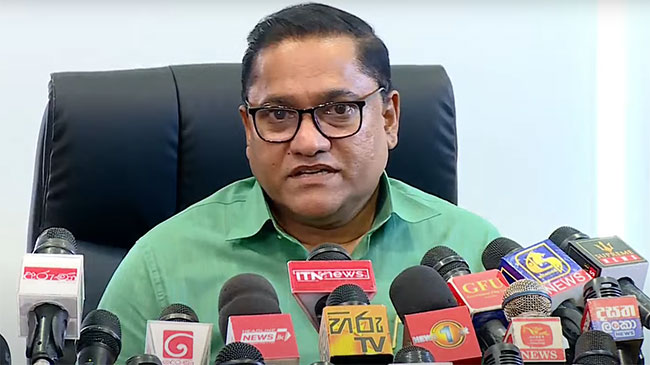Sri Lankan authorities arrest three people on suspicion of planning attacks on Israelis
The suspects are being questioned, said Minister Herath. The government is tightening controls and boosting protection for foreigners, especially tourists from Israel from "potential threats". A Muslim leader says that a "conspiracy" against the country's new leadership seeks to "destroy" the economy.
Colombo (AsiaNews) – Sri Lankan police have arrested three people based on intelligence reports of possible attacks against Israeli citizens, especially tourists, on the island nation.
Public Security Minister Vijitha Herath reassured travellers from Israel, saying that those under arrest are Sri Lankan nationals and are now in the hands of the Terrorism Investigation Division.
"They are currently being questioned to determine whether they were planning an attack targeting Israelis,” he said at a press conference yesterday.
“Given the conflict situation in the Middle East, it is our responsibility to ensure the safety of the tourists visiting Sri Lanka,” he explained. “Some information has been revealed that there may be potential threats to the safety of the tourists who visited Sri Lanka.”
The minister went on to say, “In response, to the information received, we have assigned special police security in popular tourist areas, including Arugam Bay, Bandarawela, Ella, Matara, Weligama, and Ahungalla Beach.”
Sri Lankan police announced that about 500 police officers and Special Task Force (STF) personnel have been deployed to improve security, in particular in the Arugam Bay area. Intelligence agencies and special units have been deployed to protect all foreign citizens.
Speaking on the matter, police spokesman Dig Nihal Thalduwa said that a hotline was set up for foreign tourists so that they can report any suspicious activity, adding that “security efforts have also been extended to the southern and southeastern coastal resorts."
Meanwhile, some groups representing Sri Lanka's Muslim minority have organised protests against Israel over its the wars in Gaza and Lebanon; several calls to boycott Israeli businesses along the east coast have been posted on social media.
Fear over what might happen to Israeli nationals as a result of conflicts in the Middle East prompted Israel’s National Security Council to issue a travel advisory on Wednesday urging its citizens to leave the most popular tourist areas in southern Sri Lanka.
The body, chaired by Prime Minister Benjamin Netanyahu, has classified the Arugam Bay region as a level 4 threat, advising Israelis to take precautions such as concealing their Jewish identity and avoiding large gatherings.
Minister Herath insists that, “We will restore normalcy in a few days” to safeguard the tourism industry, “allowing the travel advisories issued by the United States and other countries to be lifted. These nations are already satisfied with the measures we've implemented, and they have confidence in sending their citizens to Sri Lanka for tourism.”
In the Eastern Province, several Muslims and Sinhalese believe that, “Some powerful people are trying to tarnish the country's progress which is slowly starting with this new political move.”
The reference is to the victory in the recent presidential elections by the leftist and anti-system candidate Anura Kumara Dissanayake, while some forces "want to hold and turn this positive journey towards the troubled situation. These are [the] results of such tries,” a source in the area said.
“Our people were greatly affected by the Easter Sunday incident (when Christians were targeted). It is a fact that everyone knows that there was a big conspiracy behind it,” said Rauff Hakeem, leader of the Sri Lanka Muslim Congress, explained.
“There are suspicions that such a conspiracy is being carried out this time too, or that some effort is being made deliberately to embarrass the government and destroy the country's economy.”
Still, as a Muslim leader, he wants to be reassuring. “I assure [you] that we will never allow tourists visiting that area to be harassed” since locals “are also very careful and vigilant.”
08/10/2025 16:43
31/03/2025 16:18
15/02/2025 14:35







.png)










